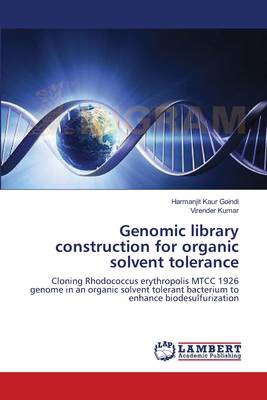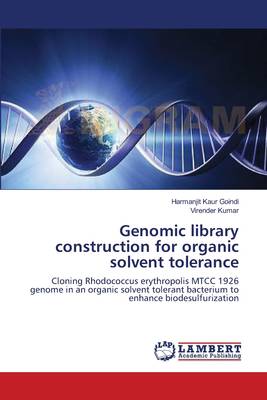
- Afhalen na 1 uur in een winkel met voorraad
- Gratis thuislevering in België vanaf € 30
- Ruim aanbod met 7 miljoen producten
- Afhalen na 1 uur in een winkel met voorraad
- Gratis thuislevering in België vanaf € 30
- Ruim aanbod met 7 miljoen producten
Zoeken
Genomic library construction for organic solvent tolerance
Cloning Rhodococcus erythropolis MTCC 1926 genome in an organic solvent tolerant bacterium to enhance biodesulfurization
Harmanjit Kaur Goindi, Virender Kumar
Paperback | Engels
€ 48,45
+ 96 punten
Omschrijving
Biodesulfurization (BDS) of fossil fuels has emerged as a promising alternative to the conventional hydrodesulfurization process for containment of sulfur oxide emissions during fuel combustion. The 4S pathway is a sulfur specific pathway that removes the sulfur atom from the recalcitrant organosulfur compounds present in fossil fuel fractions like diesel by oxidation. The end product is a sulfurless molecule, 2-hydroxybiphenyl. Though the process is very specific, however, speculations as to the bacterium's organic solvent tolerance for effective BDS process are justified. This book focuses on the construction of genomic library of a biodesulfurizing bacterium in an organic solvent bacterium in an effort to enhance biodesulfurization of a model compound dibenzothiophene, by the recombinant bacterium.
Specificaties
Betrokkenen
- Auteur(s):
- Uitgeverij:
Inhoud
- Aantal bladzijden:
- 68
- Taal:
- Engels
Eigenschappen
- Productcode (EAN):
- 9783659147197
- Verschijningsdatum:
- 2/06/2012
- Uitvoering:
- Paperback
- Formaat:
- Trade paperback (VS)
- Afmetingen:
- 152 mm x 229 mm
- Gewicht:
- 113 g

Alleen bij Standaard Boekhandel
+ 96 punten op je klantenkaart van Standaard Boekhandel
Beoordelingen
We publiceren alleen reviews die voldoen aan de voorwaarden voor reviews. Bekijk onze voorwaarden voor reviews.











